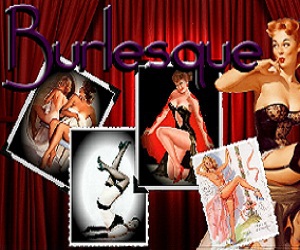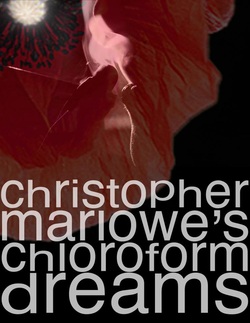There’s much more than a touch of Raymond Chandler’s Philip Marlowe in the character of Katharine Sherman‘s Christopher Marlowe in her new play, Christopher Marlowe’s Chloroform Dreams, running at the lower east side’s The Red Room. The time-and-smoke shrouded legend of the Elizabethan playwright hangs over the proceedings and propels the story all the way, and then nearly, to its end. Familiar tropes from classical mythology and fairy tale erupt everywhere in a noiresque style tale of a femme who is at once fatale and in flight. Mix in more than a strain of poetic patter and the result might be ponderous, over rich and over-reaching if it weren’t from the pen of a careful, gifted playwright who has a sharpened sense of when to call off the big thunderous themes to allow the smaller human story to breathe. Sherman is excellently served in this production by director Philip Gates who has done a great deal to let this highly theatrical, complexly structured drama flow. And flow it does, like silk, like smoke.
Gumshoe Marlowe (the playwright, not the fictional detective) is on the case and it’s a case of love’s labor’s lost as the gal he pines for, Daphne Fairchild, has a problem with the needle. It’s somewhere, sometime in the eternal noir of Hollywood’s 1940s and the environment is murky with urban underbelly, its sinners, and its saints. Daphne has taken up with contraband king Ingram Frizer, who keeps her in morphine embrace. Marlowe tries to cut a deal with Frizer to release Daphne, and Frizer, like the southern drawling megalomaniac he is, perversely agrees. Confident of the weakness of the human spirit Frizer is sure of Daphne’s faithlessness, or rather as he would have it, faithfulness to the true church of humanity – what he has to offer. The narrative evolves in non-linear fashion, jumping between episodes of elation and degradation, hopefulness and despair. We pretty much all know in what direction the story is heading and this disrupted sequencing brings a freshness to the unfolding, allowing us to see the tale as if shot from diverse angles. Clever staging and ingenious scenic design (Joshua David Bishop) work to brilliant effect in keeping the tempo up while contributing to a sense of layered story and hidden motives.
A polymorphous narrative builds in a polygeneric world. Marlowe, playwright/detective, is in search of his muse/dame, herself enthrall to intoxicating sensual abandon, emotional numbness. She is at once the mythical Daphne, in flight from the god of poetry and his promise of ennoblement, and the Sleeping Beauty, in love with a solitary dreamworld. The excellent Sheila Joon, as a supporting actress, plays three roles that give a sense of the multi-dimensionality of the story. She is Eleanor del Toro, a hardened habitue of Frizer’s drug world, with yet a pulse of sympathy for its entrapped denizens; Nicholas Skeres, one of Frizer’s goons, and the name of one of actual playwright Marlowe’s dodgy comrades; and The Ferryman, a sleazy guide in the city sewers, who takes payment in coin and conducts Marlowe to the underworld drug den where Frizer holds Daphne captivated.
In synch with this variegated narrative, and part of the torrent that carries you headlong through the performance, Sherman’s vibrant language shifts and morphs from hard-boiled, snappy Bogart/Bacall banter, through rhythmic Beat poetics, pulpit fire and brimstone, to gin-soaked Tom Waites-ian monologues, complete with the whine of a bruised melody off in the distance (wonderful sly sonics by Will Fulton). Opening lines intoned by Marlowe, characteristically slouched against a wall, collar up, hat brim down, run: Once upon a time there was a habit. A habit’a mine. For a time. A time. And once upon a time she hadda have it – the girl she had a habit she was mine. This sort of linguistic bravado might be annoying if it didn’t intimately serve the themes in the piece, echoing the broken time line the play deploys. Harmonious with the whole production, it’s vividly alive to its own artificiality, risking boldly, yet never quite overplaying itself, anchoring in small moments of naturalism that draw you back in. In the play’s intriguing, only pastoral moment (Chris Marlowe did after all bequeath us the lyric poem, The Passionate Shepherd to His Love), Marlowe, Daphne, and side-kick Tommy the Kid (Thomas Kyd? wink, wink, nudge, nudge!) share a star lit night by a campfire. Relaxed for once, Daphne observes – there’s a beam of light coursing through the trees. You can only see it if you blow smoke on it. I wanna live here forever. This eloquent line speaks volumes about Daphne’s character, as well as the play’s central themes.
But wait. Lunar Energy Productions (both Sherman and Gates are founding members) have to mix it up that one notch further. If you think you know everything that can happen in a noiresque rendering of a tale of dark addiction dovetailed with classical allusions and historical references, you might yet be surprised by a sudden eruption of ensemble dancing. Honest to god in-synch dance movements that might happen at a Madonna Super Bowl performance break out, complete with the skeevy, strung out, I-got-the-needful-jones jitters.
The laurels should be lavished, and shared here by all involved in this courageous production. Detailed attention has been paid in every department: scenic (Bishop), sound (Fulton), costume (Kalere Payton), and lighting (Alana Jacoby). The hard working actors deliver handsomely. Compelling leads, Christopher Fahmie and Valerie Redd, are squarely matched with supports Sheila Joon, Michael Markham, and Curry Whitmire. In her conflation of characters Christopher and Philip Marlowe, Sherman is really on to something. This is a hero that could go almost anywhere, uncovering nasty secrets; theatrical gold dust. We would all be lucky to have another installment. Meantime, Chloroform Dreams is knockout.
~~~
christopher marlowe’s chloroform dreams written by Katharine Sherman directed by Philip Gates . April 18 – May 5 The Red Room 85 E 4th St . Performances Wednesdays – Saturdays at 7:30pm and Saturdays at 2pm Tickets $16 ($18 at the door) Click Here for tickets







{ 0 comments… add one now }